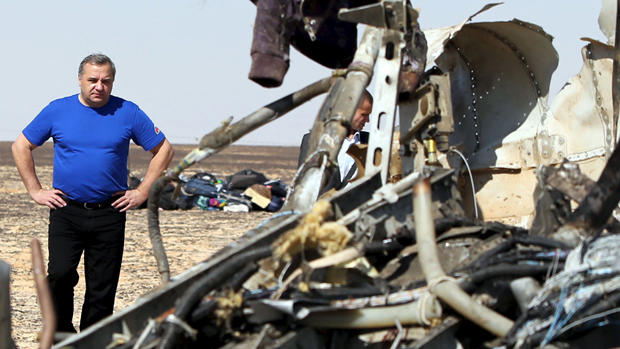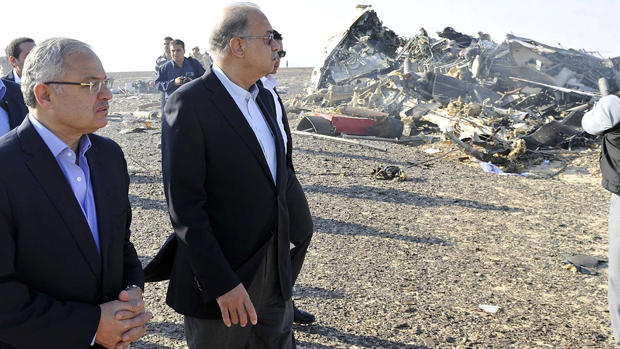U.S. intel: ISIS may have put bomb in downed Russian plane
CBS News has learned that U.S. intelligence officials say there is a possibility that ISIS planted a bomb on the Russian plane that crashed over Egypt's Sinai desert. However, U.S. investigators are not prepared to say that definitively and are taking a more cautious approach.
A source says the evidence they have so far could be used to prove that either there was a bomb on the plane or the crash was a result of a catastrophic mechanical failure.
Another source told CBS News there are clues -- but not not solid information -- that a bomb took down the Russian plane. Until U.S. investigators get the forensics back, they don't know and are not prepared to say definitively.
An ISIS affiliate in Sinai released an audio tape daring investigators to "prove that we did not take the plane down," reported CBS News' Allen Pizzey. Egyptian President Abdul Fattah al-Sisi has always dismissed the ISIS claim as "propaganda."
U.S. investigators are taking a more cautious approach as they review of evidence which suggests ISIS would want to put a bomb on a plane.
Earlier in the day, the British government also said there is a significant possibility that the crash was caused by an explosive device on board the aircraft. Evidence suggests the jetliner may have been brought down by a bomb, and they were suspending flights to and from the Sinai Peninsula as a precaution.
Ireland followed the British lead and directed Irish airlines to suspend flights to Sharm el-Sheikh Airport.
In a statement Wednesday, the Irish Aviation Authority urged airlines not to fly to or from Sharm el-Sheikh Airport or in the Sinai Peninsula "until further notice."
It said an update will be issued when more information becomes available.
In a statement Wednesday evening, the U.K. Embassy said that earlier in the evening, they delayed the return to the U.K. of British bound flights that were on the ground at Sharm el-Sheikh while they conducted a review of security at the airport. They said they had people on the ground working with the Egyptians and would like to pay tribute to the Egyptian authorities who have been extremely cooperative throughout the day.
Almost 1 million Britons visit Egypt each year, many to Sharm el-Sheikh. The resort is also enormously popular with Russians.
Egyptian President al-Sisi insisted Tuesday that the security situation in the Sinai Peninsula was under "full control" and that claims by the Islamic State of Iraq and Syria, or ISIS, that it downed the plane were "propaganda" aimed at damaging Egypt's image.
In a late development Wednesday, the head of Egypt's Sharm el-Sheikh airport was replaced amid growing international concern that the Russian plane which crashed after departing from the airport was downed by a bomb.
Adel Mahgoub, chairman of the state company that runs Egypt's civilian airports, said airport chief Abdel-Wahab Ali has been "promoted" to become his assistant. He said the move late Wednesday had nothing to do with media skepticism surrounding the airport's security. It wasn't immediately clear who would replace Ali.
The Metrojet Airbus A321-200 carrying mostly Russian vacationers from Sharm el-Sheikh back to Russia's second-largest city of St. Petersburg crashed over the Sinai early Saturday, killing all 224 people on board.
Russian officials say the plane broke up in the air 23 minutes after takeoff after reaching an altitude of 31,000 feet.
Also Wednesday, the Egyptian government said that the cockpit voice recorder recovered from the plane was partially damaged.
Mohamed Rahma, spokesman for Egypt's Ministry of Civil Aviation, said in a statement that "a lot of work" was required in order to extract data from it. He gave no further comment on the recorder.
Rahma also said that data was extracted from the plane's other "black box," the flight data recorder, for analysis.
Douglas Barrie, military aerospace expert with the International Institute for Strategic Studies in London, said it was too soon to say for sure the cause of the crash but the "general suspicion" that an explosive device was involved has been mounting. He said the British government's decision made sense.
"It's a political decision to err on the side of caution if it has been deemed possible that an explosive device was involved and there are concerns about the levels of security at the airport involved," he said.
The plane crash site, 44 miles south of the city of el-Arish, lies in the northern Sinai, where Egyptian security forces have for years battled local Islamic militants.
On the ground, rescue teams in Egypt were combing the Sinai desert for more remains and parts of the plane's fuselage Wednesday, as grief-stricken Russian families in St. Petersburg faced an agonizing wait to bury their loved ones.
Russian and Egyptian rescue workers expanded their search area in the Sinai to 15 square miles. The Russian state television channel Rossiya-24 reported the plane's tail was found 3 miles away from the rest of the wreckage.
Only one body has been released to a Russian family for burial so far. Relatives have identified 33 bodies and the paperwork is nearly finished on 22 of those, meaning the families should get the bodies shortly, Igor Albin, deputy governor of St. Petersburg, said in a televised conference call.
Metrojet, the plane's owner, and Russian authorities offered conflicting theories of what happened. Metrojet officials have insisted the crash was due to an "external impact," not a technical malfunction or pilot error. Russian officials have said it's too early to jump to that conclusion.

